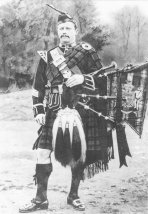© ericdentinger.com
2008-2025
Eric Maclewis - BAGPIPE SOUNDS
Eric Maclewis
The Battle's O'er
(Andy Stewart)
I returned to the fields of glory
Where the green grass and flowers grow
And the wind softly sings the story
Of the brave lads of long ago
March no more my soldier laddie
There is peace where there once was war
Sleep in peace my soldier laddie
Sleep in peace, now the battle’s o’er
In the great glen they lay a sleeping
Where the cool waters gently flow
And the gray mist is sadly weeping
For those brave lads of long ago
March no more my soldier laddie
There is peace where there once was war
Sleep in peace my soldier laddie
Sleep in peace, now the battle’s o’er
See the tall grass is there awaiting
As their banners of long ago
With their heads high were forward threading
Stepping lightly to meet the foe
March no more my soldier laddie
There is peace where there once was war
Sleep in peace my soldier laddie
Sleep in peace, now the battle’s o’er
Some return from the fields of glory
To their loved ones who held them dear
But some fell in that hour of glory
And were left to their resting here
March no more my soldier laddie
There is peace where there once was war
Sleep in peace my soldier laddie
Sleep in peace, now the battle’s o’er
(twice)
Simon Fraser
University Pipe Band
This tune has been written or adapted for Scottish bagpipes by Pipe Major William Robb (1863-1909, Argyll and Sutherland Highlanders) in the 19th century: it was first published in 1884 as a Slow Air while it is now played like a March.
The melody has, in its first sentence, some features in common with a previous tune accompanying a poem by the Irishman Thomas Moore (1805): The Last Rose Of Summer.
It can be interpreted at 86 bpm, for example just behind The Green Hills Of Tyrol.
NB: when it comes to military retreat airs (Retreat March or Retreat Air), you should not be "abused" by the word “retreat” which suggests that these melodies are played at a particular moment in a battle.
On the contrary, these tunes are rather interpreted at the camp to punctuate a period of the day such as the end of the day service.
WHEN THE BATTLE
IS OVER
RETREAT AIR
- score by Eric Maclewis with CelticPipes
I wrote my score from the Scots Guards - vol 1: there are slight differences with what McGillivray proposes with the rhythm of the 3rd beat -bars 1 and 5 and also, in the 2nd sentence, with a E doubling instead of a G grace note, bars 11 and 15.
Nothing fundamental for a soloist...










